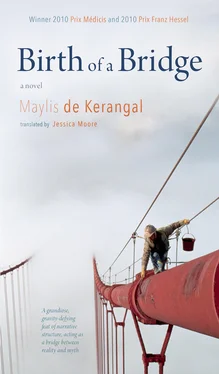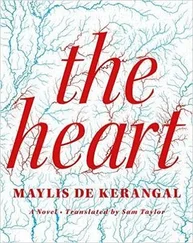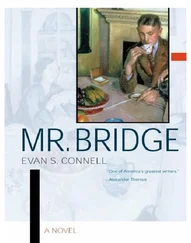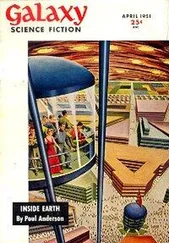THE OTHERS — the ones who worked for Pontoverde — went home victorious that night, re-energized, they had a bridge to build, their healthy bodies personified progress, their own hands would place a stone, they relished this coup shaped like fate, sure of themselves now as main characters in the world play. They too lingered in their vehicles, engines off, eyes riveted to a dried laurel leaf on the windshield and arms crossed over their chests, seat leaned back, and they too sat silently thinking about their coming expatriation; weighing their careers that were suddenly accelerated because they knew how to nod at an opportunity; counting the points they would rack up before going back to head office to occupy a superior position, which would include overseeing the reorganization of whatever department they would now be in charge of; and also reflecting on a potential move with the family, or imagining themselves relocated and single, commuting during school vacations — they too were suddenly ready to go, but this wasn’t a joyride, wasn’t dropping out, not really a vacation; now they had to gear themselves up to talk to their wives, to tell them the news; and some wives would puff up their chests with happiness and pride, they were good companions, their husbands were successful, had stature, and they would daydream themselves into a near future where they were spoiled by the company, served by local maids, a villa with a pool, yes, at the very least, two cars, a gardener, and a full-time nanny who was also a devoted cook, brilliant! Already they were laughing and going to wake up the kids, ready for the sweet leap up the social ladder; others, dismayed, would tidy the kitchen nervously in silence, and finally turn an anguished face towards their husbands because, dear, what are we going to do about school for the older ones, about my sick parents, about the little one’s speech therapist? These wives would need to be reassured, promised that they would have their say in all this, the whole thing had to be toned down, they had to be made to understand that their husbands were counting on them; while finally there was a handful of others, these ones the toughest by far, who would light up a smoke once the washing machine was on, and then, whoosh , they’d spin around to face their husband, butts pressed against the sink and faces lit strangely by the overhead light, unreal and yet marmoreal, like Marlene Dietrich, an ambiguous shading that made them enigmatic, abominably distant, and these ones would smile and conclude in a sardonic voice, I’m very happy for you, dear, but what’s my place in all this? These ones would hold tight to their jobs, they would need to be convinced, pressured, until finally one night their foot consents once again to creep beneath the sheets and caress the foot of the man stretched out next to them; their husbands would have to use cunning until they made this little gesture, this caress of the skin, a subtle sign of agreement that would grant their husbands the world — and these latter could then silently triumph, lying on their backs perfectly still. Then, once the family’s departure date was set, restlessness would set in. They would still need to cancel the lease, the phone, and the electricity, find storage — and then sort out this mess, the kids’ messes and their own, broken toys, outgrown clothes, piles of old magazines, chipped vases, faded photographs, everything in the dross; go to the doctor, say goodbye to friends and family, and finally pack their bags and head to Coca. And this is exactly what they did late August, early September.
THEY WEREN’T the only ones to leave. All kinds of people set out in the violet night and converged in the city whose soda pop name jangled like thousands of corrosive little pins in their dry mouths. The want ads that popped up on the web called for cable riggers, ironworkers, welders, concrete form setters, asphalt paving crews, crane operators, scaffolding builders, heavy-lifting contractors, excavators — these skilled workers packed their bags in a single movement, synchronized, a tight manoeuvre, and set off by any means they could. A first wave stuffed themselves into cargo planes chartered by subcontractors who specialized in recruiting skilled labourers — these companies worked fast and with clichéd racism: preferring the strong Turk, the industrious Korean, the aesthetic Tunisian, the Finnish carpenter, the Austrian cabinet maker, and the Kenyan geometrician; avoiding the dancing Greek and the stormy Spaniard, the Japanese hypocrite and the impulsive Slav. The chosen ones, poor terrified guys dealing with their baptism by air, barfed up their guts at the back of the cabin. Others jumped on the backs of freight trains where they were immediately jounced about, asses bouncing on the floor as though on a tatami, and propped themselves up against their bags that knocked together, soon dizzy with noise and dust, heads between their knees because their eyes were tearing. And there were others still who boarded the buses that fill the night highway, those public dangers handled by drivers with bugged-out eyes — lack of sleep, coke — transport for the poor who don’t have three hundred dollars to put down on a used car and so are picked up like stragglers by the street sweeper, that’s why it stinks in here, the velour of the seats soaked with fatigue and cold sweat, a smell of tired feet — we all know that’s the real smell of humanity; these ones wait in miserable little parking lots at the city limits and lift a gloomy arm so the driver will stop, the news of the site had spread like wildfire, and the city already shimmered in a corner of their brains; finally, there were some who arrived on foot, and it seemed that nothing could make them deviate from their path — they headed straight there, like dogs, as though they had followed the scent of a magic rag rubbed against their noses, while still others were simply vagrants, people for whom here or there was the same thing, who had a certain idea of their life and proudly believed that they had a right to adventure.
A thin-legged Chinese fellow with a profile like a cliff is among these last — his name is Mo Yun. Nine months earlier, a miner among millions of others — miner because his father and mother are miners, miner because he’s nothing else and ’cause to descend to the bottom of the hole is simply to follow the greater movement — he suddenly turns his back on Datong, world capital of slag heaps, violent proletarian hot pot — a real survival instinct, since scampering off from the rut of childhood meant giving his youth a chance; after that, even if it was miserable, wandering has the taste of the potato chosen from among all the rest for its shape and colour, and the smallest radish smells like freedom. Mo crosses Mongolia huddled in the back of a four-by-four with a couple of Russian botanists, and once they’re in the suburbs of Ulan Bator, hops to his feet and turns off to the right, heads straight to the sea, three months of travelling, who knows with what money and especially where he finds the strength, then boards a Dutch container ship and does Vladivostok — Vancouver in fifteen days, fifteen days of darkness at the end of which Mo emerges from his waterproof bulkhead compartment one icy night. The city looks deserted. He heads south at the back of a Greyhound bus, and once he reaches San Francisco, Chinatown, knocks on the door of a scuzzy joint on Grant Avenue, a greasy but profitable dive where one of his uncles exploits him sixteen to eighteen hours a day for four months. It’s there, in the back kitchen, that he first hears talk of the bridge, and he calmly puts down teapots and rice boxes, unties his apron, passes through the restaurant by the central aisle, and pushes open the front door — the customers’ door, the main door — he chooses this one and not another one, the inaugural door, see ya! His brown feet, at present, are thickened with corns, callused, and etched with the wrinkled trace of the world map, he’s seventeen years old and he can see the lights of Coca.
Читать дальше












